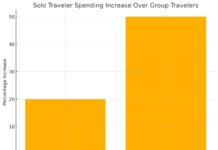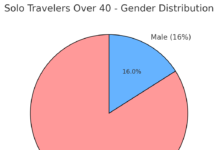
Artificial Intelligence (AI) has revolutionized numerous industries, and the travel sector is no exception. From enhancing travel planning to streamlining customer service, AI has become an indispensable tool for the modern travel industry. In this article, we will explore five fascinating examples of how AI is transforming the travel experience for globetrotters.
AI in Travel Planning
AI-Powered Itinerary Planning
Gone are the days of spending hours researching destinations and crafting travel itineraries. AI-powered tools now make this process effortless. By analyzing vast amounts of data, including traveler preferences, weather conditions, local events, and even historical trends, AI can generate personalized travel itineraries tailored to individual needs. These AI-driven itineraries ensure that travelers can make the most of their trips, discovering hidden gems and optimizing their time.
Personalized Travel Recommendations
With AI, travel platforms can offer personalized recommendations to users, inspiring them to explore new destinations and experiences. By leveraging machine learning algorithms, these platforms understand user behavior, past travel choices, and preferences, enabling them to suggest hotels, activities, and attractions that align with the traveler’s interests. This personalized touch enhances the overall travel planning experience and encourages travelers to embark on unique adventures.
AI in Customer Service
AI Chatbots for Instant Support
AI-driven chatbots have become the front-line assistants for travelers seeking quick answers and support. These virtual assistants can handle a wide range of customer inquiries, such as flight information, hotel bookings, and general travel queries. Thanks to natural language processing capabilities, AI chatbots engage in meaningful conversations, providing real-time solutions to travelers’ questions, which significantly improves customer satisfaction and reduces response time.
Voice Assistants for Travel Queries
Voice-controlled AI assistants, such as Amazon’s Alexa and Apple’s Siri, have made their way into the travel industry. Travelers can now use voice commands to check flight statuses, obtain destination information, or even book accommodation. The convenience and ease of use provided by these voice assistants streamline the travel experience and cater to tech-savvy travelers who prefer hands-free interactions.
AI in Language Translation
Breaking Language Barriers
AI-powered language translation apps have become invaluable companions for international travelers. These apps can instantly translate speech and text between languages, bridging communication gaps and making it easier for travelers to interact with locals and understand foreign signage. The accuracy and speed of AI translation services have made language barriers less daunting, promoting cross-cultural exchange and fostering better connections during travel.
Real-Time Translation Services
AI-powered earbuds and handheld devices can now provide real-time translation during face-to-face conversations. This breakthrough technology enables travelers to have fluid conversations with locals without the need for a human translator. The ability to communicate effortlessly, even in remote regions with limited language support, makes traveling more accessible and enriching for global explorers.
AI in Predictive Pricing
Dynamic Pricing Algorithms
The travel industry often experiences fluctuating prices for flights and accommodation due to various factors. AI-powered dynamic pricing algorithms analyze historical data, market demand, and external influences to predict pricing trends accurately. Travelers can take advantage of this information to identify the most cost-effective times to book flights and hotels, ensuring significant cost savings.
Fare Prediction for Cost Savings
AI-driven fare prediction tools are transforming the way travelers approach ticket purchases. By predicting future airfare fluctuations, travelers can make informed decisions on when to book tickets, avoiding overpaying for flights. This cost-saving aspect of AI has made traveling more affordable for budget-conscious individuals and encouraged more people to explore the world.
AI in Safety and Security
Enhancing Travel Safety
AI is enhancing travel safety through various applications, such as monitoring weather conditions, identifying potential risks, and offering real-time travel advisories. Travelers can stay informed about safety concerns and take necessary precautions while exploring new destinations, ensuring a secure travel experience.
AI-Based Security Systems
AI-powered security systems are transforming the safety measures at airports, train stations, and other travel hubs. Advanced facial recognition and behavior analysis technologies enable efficient identification of potential threats. This not only improves security but also expedites the passenger screening process, leading to smoother travel experiences.
Conclusion
AI has undoubtedly become a game-changer in the travel industry. From simplifying travel planning with personalized itineraries to enhancing customer service with AI chatbots and voice assistants, AI technology has made traveling more convenient and enjoyable. Moreover, AI’s role in breaking language barriers, predicting pricing fluctuations, and ensuring travel safety has opened new possibilities for globetrotters worldwide. As AI continues to evolve, we can expect further advancements that will redefine the travel experience.
Go ahead and check out how you can use AI with hopper to plan your next vacation https://d3.harvard.edu/platform-digit/submission/hopper-using-ai-to-plan-your-next-vacation/



























